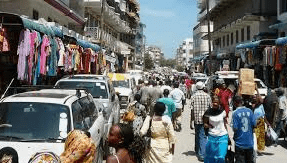According to the Ghana 2024 Integrated Business Establishment Survey by the Ghana Statistical Service, 92.3% of businesses in Ghana remain informal with just 7.7% in the formal sector.
These informal businesses fail to keep any formal accounts. The report further reveals that over 1.2 million businesses were established from 2014 to 2024, with most recording low revenues annually.
The Ghana Statistical Service report showed that at least 55.0% of large-sized and medium-sized privately owned establishments are formal.
Interestingly, more than three-quarters of privately-owned establishments are in the services sector, with those owned by non-Ghanaians having the highest proportion (86.9%).
An earlier report by the Ghana Statistical Service (GSS) demonstrated that although every eight out of 10 employed people are in the informal sector, their productivity contribution to the country’s (Gross Domestic Product) GDP is only 27.4 percent.
In fact, informal employment has remained highly pervasive in the country with no substantial reduction over the past decades.
The reason why this trend is disturbing is that, for workers and business owners, the consequences of informality can be significant. They impede the full exercise of rights and limit access to social security systems, notably social insurance.
The relationship between productivity and decent work goes both ways – productivity allows wages and working conditions to improve, but better wages and working conditions also contribute to productivity growth.
While offering the advantage of employment flexibility in some economies, a large informal sector is associated with low productivity, reduced tax revenues, poor governance, excessive regulations and poverty and income inequity.
Addressing the challenge of pervasive informality will require comprehensive policies that take into account country-specific conditions. Additionally, the informal economy tends to employ lower-skilled and less productive workers.
The informal economy refers to all economic activities by workers and economic units that are – in law or in practice – not covered or insufficiently covered by formal arrangements.
According to the International Labour Organisation (ILO), more than half the global labour force is engaged in informal work.
The IMF says 60% of all workers are involved in unregulated jobs. That amounts to around two billion workers employed in informal jobs and four out of every five businesses are not formally registered.










